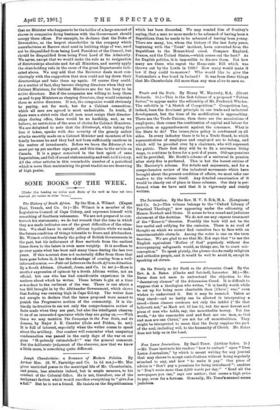SOME BOOKS OF THE WEEK.
rUncler this heading we notice such Books of the week as hare not been reserved for review in other 'eras.] The History of South Africa. By the Hon. A. Wilmot. (Kegan Paul, Trench, and Co. 55 )—Mr. Wilmot is a member of the Legislative Council of Cape Colony, and expresses himself with something of Southern vehemence. We are not prepared to con- trove' t his statements ; we do but remark that the tone in which they ale made indicates one of the great difficulties of the situa- tion. We shall have to satisfy African loyalists while we make the future condition of things tolerable to Boers and Afrikanders. Mr. Wilmot criticises freely the policy of British Governments in the past, but his indictment of Boer methods from the earliest times down to the latest is even more weighty. It is needless to go over again what has been said many times during the last two years. If this account does not materially differ from those that have gone before it, it has the advantage of coming from a well- informed source. — PoLit,cal Letters on the South African Situation. By a South African. (Gaskell, Jones, and Co. is. net.)—Here is another expression of opinion by a South African writer, not an official, but one who has had considerable experience in the matters about which he writes. These letters begin at a time antecedent to the outbreak of the war. There is one about a tax Bill brought in by the Afrikander Government, which shows that feeling was running high in Cape Colony. The writer does not scruple to declare that the taxes proposed were meant to punish the Progressive section of the community. It is dis- tinctly instructive to see not only the comprehensive review of facts made when they are past, but also the intelligent observe- ns of an interested spectator while they are going on.—With these we may mention The Campaign in the Free State, and its Lessons, by Major J. E. Caunter (Gale and Polden, 2s. net.). It is full of interest, especially when the writer comes to speak about the artillery. Our readers will remember what unsparing condemnation was passed in the early days of the war on our guns "Hopelessly outmatched !" was the general comment. But the deliberate judgment of the observer, now that we know a little more, is something quite different.






















































 Previous page
Previous page